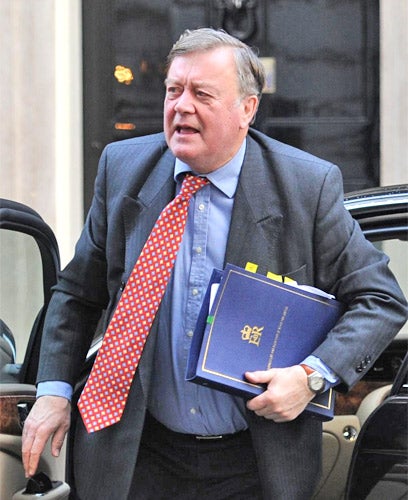Clarke cuts back on automatic prison sentences

Minimum sentences for murder are set to be abolished and thousands of people will escape prison altogether as part of the largest shake-up of the criminal justice system in decades.
Overturning years of Conservative Party orthodoxy that "prison works" Kenneth Clarke, the Justice Secretary, said he wanted to reduce the Britain's jail population by at least 3,000 by 2015.
But there was immediate anger from some on the right of his party who derided Mr Clarke's assertion that prison should no longer be treated as an "expensive way of giving communities a break".
Under the plans, detailed in a Green Paper published yesterday:
* Foreign criminals charged with less serious offences will be able to escape a prison sentence in Britain altogether by agreeing to be deported.
* Suspects who plead guilty at the "earliest opportunity" will have their sentence cut by 50 per cent.
* Limiting the number of suspects remanded in prison pending trial.
* A new release test for prisoners who are serving "indeterminate" sentences that will see many freed.
* Treating offenders with mental health issues in the community.
At the same time there will be a big increase in the use of community punishments with private companies brought into run schemes and paid according to how many criminals they stop reoffending.
In some cases criminals could pay to avoid any punishment if they pay a large fine or compensation to victims.
But it is Mr Clarke's plans to reform of Britain's murder laws and sentencing for serious offences that is likely to be most controversial.
At present anyone found guilty of murder receives a minimum tariff of 15, 25 or 30 years in jail or in the worst cases a whole-life tariff. The tariff depends on the type of murder, the weapon used and other aggravating factors such as hate crimes.
Mr Clarke said he wanted to return discretion for murder sentences to judges. "You don't need to tell judges that murder is a serious offence by setting minimum terms," he said.
"They are the people who hear the evidence and are best placed to determine what the sentence should be."
Mr Clarke said the sentencing rules were "complete nonsense".
"At the moment someone would get a longer sentence for stabbing me to death with a knife than strangling me painfully," he said.
The change could result in significantly shorter sentences for mercy killings and some domestic murders.
Controversial indefinite sentences for the public protection, widely criticised as a mistake by prison reform campaigners, will be restricted to only the most serious offenders who are sentenced to more than 10 years.
In a statement to the Commons Mr Clarke said sentencing policy needed a "radically different approach".
"I regard prison first and foremost as a place of punishment where people lose their liberty as reparation for what they have done. On top of that, prison cannot continue to be simply an expensive way of giving communities a break."
Young offenders could have their juvenile criminal record wiped clean once they reach 18 so they are not stopped from pursuing options such as higher education or prevented from getting jobs.
Mr Clarke also wants to cut the numbers of foreign national offenders, who made up about 13 per cent of the total prison population of more than 85,000. Options for removing more of these offenders from the UK, rather than jailing them here at the taxpayers' expense, are being considered.
Prison reformers welcomed the changes. Juliet Lyon, director of the Prison Reform Trust, said: "The Green Paper is a blueprint for moderate and sensible reform." But he was challenged by Tory MP Edward Leigh who said: "Communities deserve a break – they deserve a break from being burgled."
Tough on crime? What his predecessors did
Michael Howard
Michael Howard started the prison sentencing "political arms race" in 1993 when he declared that "Prison works", adding: "This may mean that more people will go to prison. I do not flinch from that." Howard followed this up with the 1994 Criminal Justice Act which removed the right to silence and provided greater penalties for a number of crimes and tougher restrictions on bail.
David Blunkett
Shortly after becoming Labour's first Home Secretary, Blunkett announced plans to stop violent and dangerous offenders from being freed two-thirds of the way through their sentences. He also allowed courts to take previous convictions into account when sentencing, a change of direction from the policy of courts punishing for the crime, not on the criminal's history.
Jack Straw
As Justice Secretary, Jack Straw introduced proposals for people who commit murder with a knife to face significantly longer in prison. The legislation meant that the minimum prison term set by a court which knife killers must serve before they are considered for release by the Parole Board increased by a decade, from 15 to 25 years. That rise is now to be reviewed.
Subscribe to Independent Premium to bookmark this article
Want to bookmark your favourite articles and stories to read or reference later? Start your Independent Premium subscription today.

Join our commenting forum
Join thought-provoking conversations, follow other Independent readers and see their replies